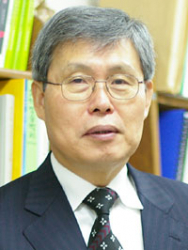Hak-Soo Kim
Fellow, Korean Academy of Science and Technology (KAST)

Hak-Soo Kim got a PhD degree (March 1982) in Communication from the University of Washington in Seattle, USA, after having gotten a MA and a BA degrees respectively from Seoul National University and Yonsei University, Seoul, South Korea. Currently he is Distinguished Professor, College of Transdisciplinary Studies of DGIST (Daegu-Gyeongbuk Institute of Science and Technology) in Daegu and Emeritus Professor of Communication, Sogang University in Seoul, South Korea. He is also Fellow, International Communication Association (ICA) and Korean Academy of Science and Technology (KAST). He was the 28th President of Korean Society for Journalism and Communication Studies (KSJCS) and Founder & first Chair of the Special Committee on SHARE (Science, Health, Agriculture, Risk and Environment) Communication, AASSA (Association of Academies and Societies of Sciences in Asia) that is an Asian wing of IAP. He is newly appointed as Member, Korea’s Institute for Basic Science (IBS) Scientific Advisory Board (SAB). He has been internationally a pioneer of theory and research on science communication and social science in general. His major, recent, and ‘English’ publications are as follows:
“Realizing Interdisciplinarity Among Science, Humanism, and Art: A New Paradigmatic Explication of Community Problem Solving.” Asian Communication Research, 17(3) (December 2020): 20-54. DOI: 10.20879/acr.2020.17.3.20
“South Korea: A Different Exemplar.” In: Toss Gascoigne et al. (Eds.), Communicating Science: A Global Perspective (pp. 801-824). Canberra, Australia: The Australian National University, 2020. DOI: 10.22459/CS.2020.33
“The Authority of Science in Korea: A New Explication and Measurement.” In: Martin Bauer, Petra Pansegrau, and Rajesh Shukla (Eds.), The Cultural Authority of Science: Comparing Across Europe, Asia, Africa and the Americas (pp. 44-56). New York: Routledge, 2019.
“Climate Change, Science and Community.” Public Understanding of Science, 21(3), (April 2012): 268-285.
“Engagement: The Key to the Communicative Effectiveness of Science and Ideas.” In: Bernard Schiele, Michel Claessens & Shunke Shi (Eds.), Science Communication in the World: Practices, Theories and Trends (pp. 269-280). New York: Springer, 2012.
“Measuring PEP/IS, a New Model for Communicative Effectiveness of Science.” In: Martin Bauer, Rajesh Shukla & Nick Allum (Eds.), The Culture of Science: How the Public Relates to Science Across the Globe (pp. 375-384). New York: Routledge, 2012.
“Nehru’s Scientific Temper as Battling Against Pseudo Sciences.” In: Hasan Jawaid Kahn, Gauhar Raza, Surjit Singh & Subodh Mahanti (Eds.), Quest for Scientific Temper (pp. 113-123). New Delhi, India: CSIR-NISAIR, 2012.
“PEP/IS: A New Model for Communicative Effectiveness of Science.” Science Communication, 28(3), (March 2007): 287-313.